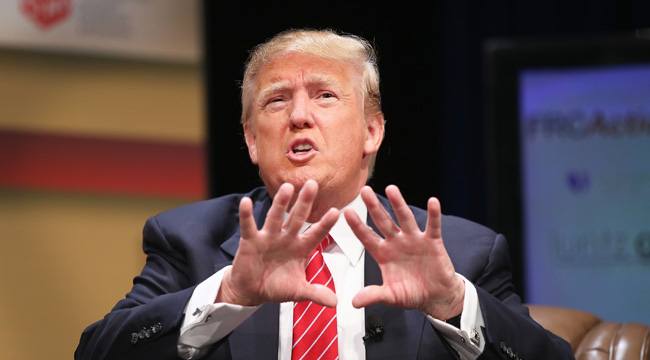
For the second time in a week, Donald Trump has been profiled by the New York Times. The last time this happened, things didn’t work out swell for the real estate mogul. Journalist Michael Barbaro spoke to many women who experienced sexist Trump words and actions over the decades. In response, Trump was pretty peeved at the overwhelming negativity of the piece and called for Barbaro’s resignation. His eldest daughter, Ivanka, stepped up to insist her dad is “not a groper,” which sure is a crazy thing for a daughter to have to say. Yet nothing is normal about this election.
Despite the obvious friction between the NY Times and Trump, the paper’s magazine edition published another profile today. This piece is the work of Robert Draper, who spent time at Trump campaign headquarters to produce a portrait of the candidate before the Wisconsin primary (won by Ted Cruz). The entire profile is worth a read, but one important diversion touches upon Trump’s wavering stance on abortion. For this campaign, he’s largely favored a pro-life stance, but there sure as hell have been flip-flops. In March, Chris Matthews asked a series of tough questions, and Trump ended up saying there should be “some form of punishment” for women who have abortions.
The resulting backlash caused even Ted Cruz to issue an appalled reaction. Trump walked back his sentiment, and he also spent some time in the cheery atmosphere of Rockefeller Plaza (speaking on Today) to tell the breakfast bunch that abortion exceptions are something that should exist. Now Trump has adjusted his stance yet again, and here’s the latest version:
MSNBC host Chris Matthews asked him whether his pro-life views meant that he also supported criminal penalties for a woman who had an abortion. Trump had replied that yes, there should be “some form of punishment.” Now he argued to me, rather unconvincingly, that he had been misinterpreted: “I didn’t mean punishment for women like prison. I’m saying women punish themselves. I didn’t want people to think in terms of ‘prison’ punishment. And because of that I walked it back.”
A senior Trump adviser tried to cushion this wavering stance as Trump being “a serial non-apologizer,” but Trump simply cannot make up his mind on anything. And of course, he thinks women punish themselves while not realizing that it’s not really his business how women privately cope with an abortion. Some women are sad, and others feel relieved after the procedure. Yet it’s not really clear what Trump’s saying. Is Trump simply observing that women do punish themselves, or is he telling them to do so?
One particularly amusing moment in the profile occurs when campaign manager Corey Lewandowski tries to explain the complicated Missouri primary to Trump. At that point, the state carried a narrow margin and was still in process of delegate certification. Trump didn’t understand why the process was taking so long. Couldn’t they couldn’t simply count the state’s votes and declare a winner? Then Trump gets some bad news:
Lewandowski patiently explained. “You’ve won a series of congressional districts. You won five of them, which is 25 delegates. Cruz won three — so 15 for him.” Distaste clouded Trump’s face. Like most Americans, he had until recently been almost completely ignorant of the obscure mechanics by which a candidate became the party nominee. To win the nomination, he needed the support of 1,237 delegates. Achieving this was not as straightforward as simply winning the most votes in primaries.
As easy as it would be to knock Trump over needing a delegate crash course, he’s certainly not alone. Still, one would hope that presidential candidates at least understand the process before entering the race and — maybe, just accidentally — succeeding.
(Via New York Times)
